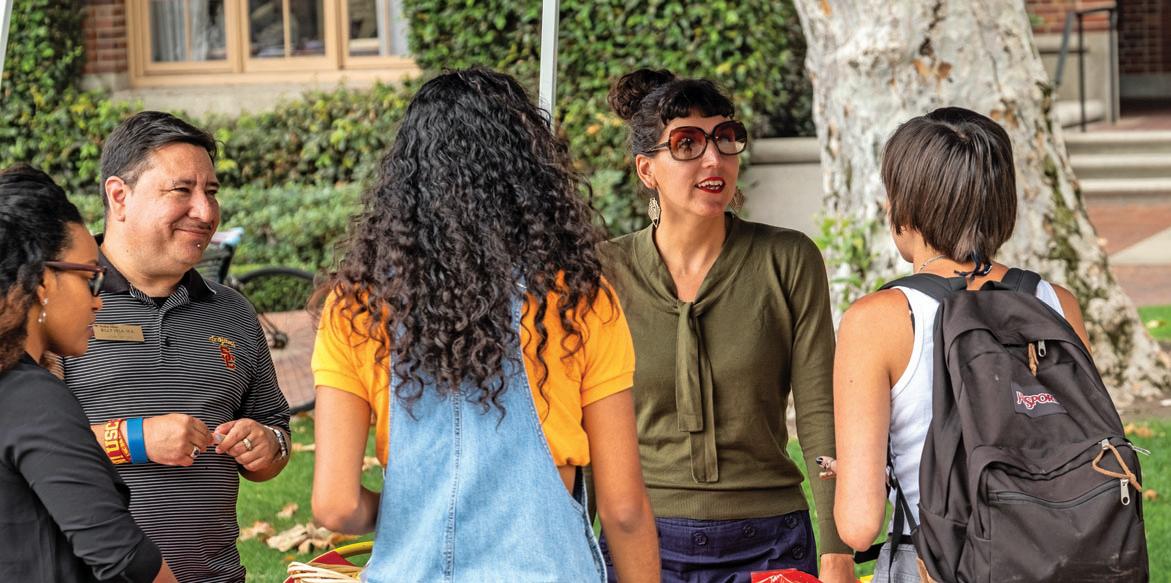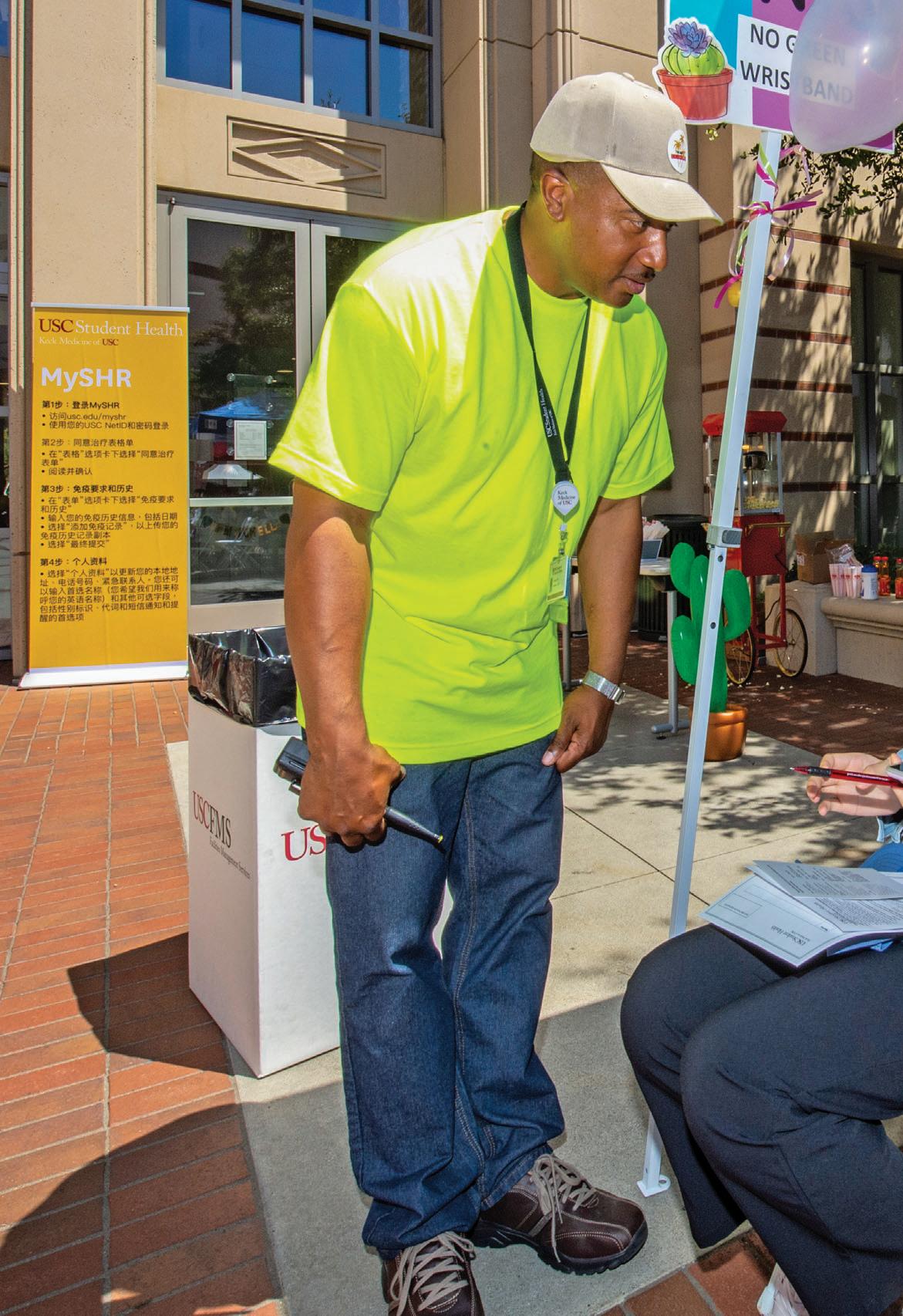
15 minute read
Summary of Improvements
2018 Summary of Improvements
WITH UPDATES AS OF FALL 2019
Leadership, Oversight and Direction
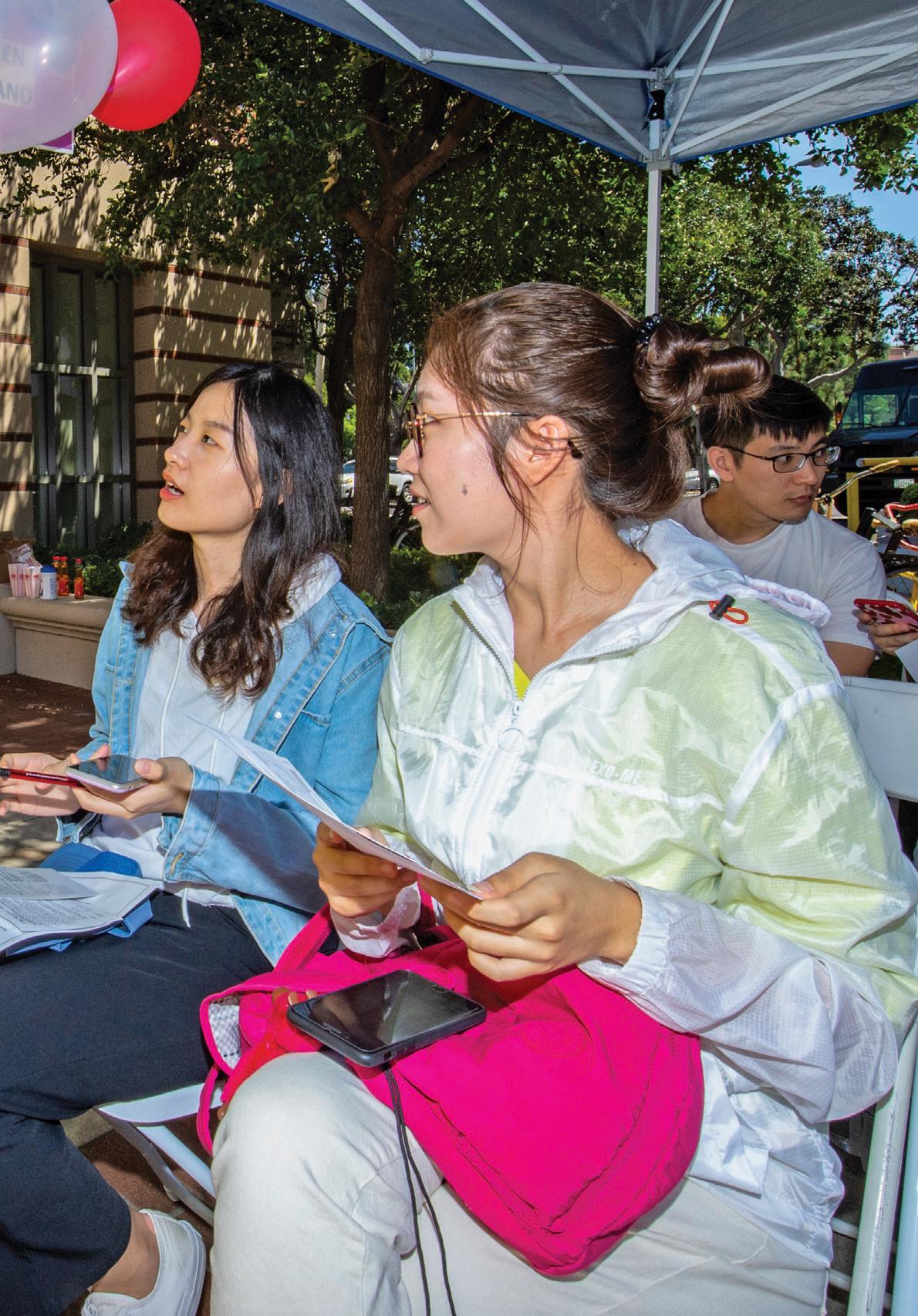
Nationally renowned medical center Keck Medicine of USC assumed responsibility for all clinical care provided by USC Student Health, at both the Engemann and Eric Cohen Health Centers, as of August 2017. This oversight means health care providers are faculty within the departments as follows:
Counseling and Mental Health Services, a division of the Department of Psychiatry and Behavioral Sciences, Keck School of Medicine of USC
Medical Services, with providers on clinical faculty of the Departments of Family Medicine, Obstetrics and Gynecology, Dermatology, Orthopaedic Surgery, Keck School of Medicine of USC; and professional affiliations with the USC Chan Division of Occupational Science and Occupational Therapy, the USC School of Pharmacy, and the Division of Physical Therapy and Biokinesiology.
Relationship and Sexual Violence Prevention and Services, with counselors who are clinical faculty of the Department of Psychiatry and Behavioral Sciences, Keck School of Medicine of USC

All clinical faculty appointments undergo a rigorous credentialing process. As part of Keck Medicine, any concerns about quality of care or physician behavior are immediately reviewed and evaluated by physician leadership at USC Student Health, by the Office of Integrated Risk Management and subject to peer review by the Integrated Executive Peer Review committee of the medical group.
External Accreditation: USC Student Health is externally accredited by the Accreditation Association for Ambulatory Health Care (AAAHC). AAAHC standards include: • Requirements for regular peer review • Routine patient satisfaction surveys • A structured process for management of grievances and patient complaints
Newly Appointed Associate Vice Provost and Chief Health Officer, Dr. Sarah Van Orman, is the lead for all of USC Student Health, as of August 2017. She also serves as the Division Chief for College Health in the Department of Family Medicine, Keck School of Medicine of USC. Dr. Van Orman is a board certified internal medicine and pediatrics physician, past president of the American College Health Association, and has nearly 25 year of college health leadership experience. Most recently she served as the executive director of University Health Services at the University of Wisconsin-Madison where for nearly a decade, she helped UW–Madison navigate some of the toughest issues around college student health: high-risk drinking, sexual assault, student mental health and infectious diseases including meningitis and norovirus. Dr. Van Orman received her B.A. from Carleton College; her M.D. from Mayo Medical School, completed residency at the University of Chicago and earned a M.M.M. from Carnegie Mellon University.
Newly Appointed Executive Director of Mental Health, Dr. Robert Mendola is the lead for student counseling and mental health services in USC Student Health, as of September 1, 2017. He also serves as the Division Chief of Student Mental Health in the Department of Psychiatry and Behavioral Science, Keck School of Medicine of USC. He is board certified in adult psychiatry and has served as the director for psychiatric services at Cornell University’s student counseling center for over two decades. He received his M.D. from SUNY Buffalo and completed his residency at the University of Massachusetts. He has over 25 years of experience treating students as well as conceptualizing and implementing care models for university counseling centers.
Newly Appointed Executive Director of Clinical Operations, Thu NguyenKnowles has spent the has spent more than two decades in healthcare operations, leading clinical and nonclinical teammates, patient experience, and providing ambulatory care for seniors and chronically ill patients for HealthCare Partners. Nguyen-Knowles earned her registered nurse license at Santa Ana College, and her master’s in nursing from Walden University. As an expert in patient experience, Nguyen-Knowles is working to enhance the journey for every patient who encounters USC Student Health. Nguyen-Knowles has been applying her extensive knowledge of access to healthcare to continually improve quality of care and patient satisfaction, and has implemented training in a care model that engages multidisciplinary departments at every step in the patient’s journey to ensure seamless hand-off and care.
STAFF TRAINING
Over the past year, we have provided extensive training on staffing and complaint reporting, and we will continue this training with additional sessions scheduled this summer and fall to ensure that when concerning behavior and actions are noticed, they are quickly reported and addressed.
2018 Praesidium Trainings — Praesidium, an external training and education organization focusing on abuse protection research and prevention, provided a training for all USC Student Health medical providers.
2019 update: LGBTQ+ Care — Student Health has continued efforts to increase staff competence in care for LGBTQ+ students. All medical staff recently completed trainings from the National LGBT Health Education Center of Fenway Health. The Center works with organizations throughout the nation and the world with the goal of eliminating health disparities among LGBT people; their work through educational programs and technical assistance to health care organizations nationally and internationally helps provide accessible, high quality, and cost effective care to LGBT people.
2019 update: Trauma-Informed Care — USC Student Health has made a commitment to move into the model of a trauma-informed organization; all departments are in the process of completing training on trauma-sensitive conduct, practice, and understanding the neuroscience of trauma impact. A Trauma-Informed Approach, often referred to as trauma-informed care (TIC), is a promising model for organizational change in health, behavioral health, and other settings that promote resilience in staff and patients. Key principles of this approach include organizational safety, trustworthiness, transparency, cultural sensitivity, collaboration, and empowerment among and between staff and patients.
PATIENT EXPERIENCE
In an effort to best serve a patient seeking care, expanded efforts are underway to promote the use of the Student Health portal (MySHR) to decrease wait times and ensure that as many students as possible are given same-day or next-day appointments. Streamlining all phone routing to a single number, 213-740-9355 (WELL) also creates better patient retention of important numbers. We are integrating operations between Engemann and Eric Cohen Health Centers so students will be able to use either center in the fall of 2018.
2019 update: Integration of operations is now complete; students at both campuses may use services in both locations interchangeably. This includes medical, counseling and mental health, and sexual assault advocacy and response services, as well as all public health promotion activities.
IMPROVING ACCESS TO CARE
In 2019, two new projects are launching to expand access to care by addressing cost of health care for uninsured/underinsured students.
2019 update: USG-funded grant for covering expanded HIV testing. In partnership with Undergraduate Student Government, students who may need HIV testing (in addition to the insurance-covered annual screening) are now eligible for grant-based support so they do not have to bear additional out-ofpocket costs. This program is available to both undergraduate and graduate students who are patients of USC Student Health.
2019 update: Insurance Support for Low-income, Out of State Students. In partnership with the Office of Financial Aid, USC Student Health SHIP (Student Health Insurance Plan is working to assist out-of-state students who are on Medicaid; through temporary aid for coverage under SHIP, as they transition to qualify for care under Medi-Cal.
Counseling and Mental Health Services
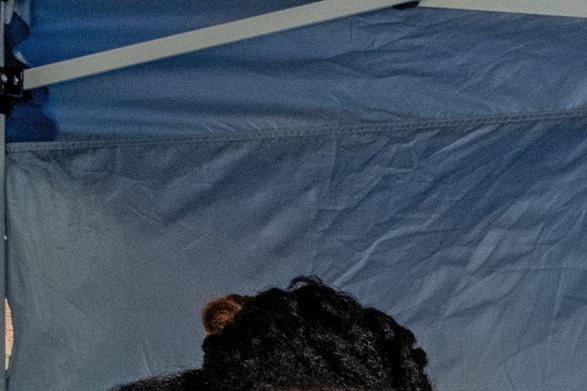
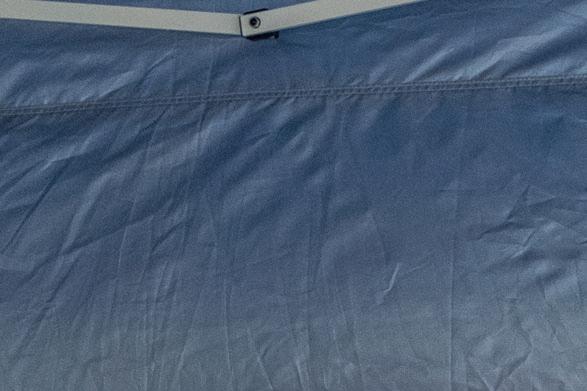
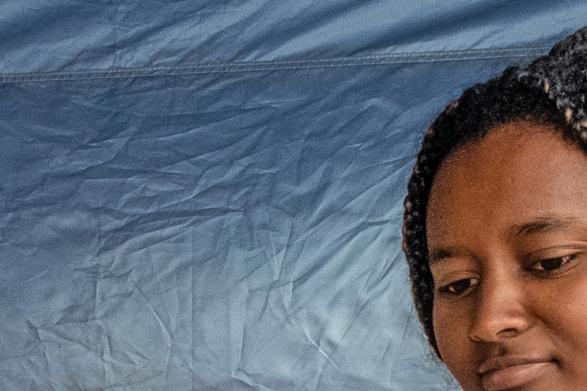
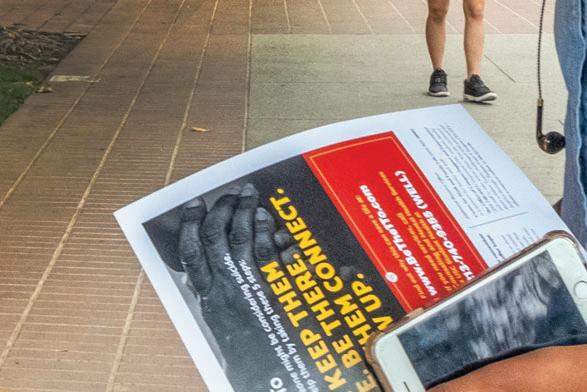
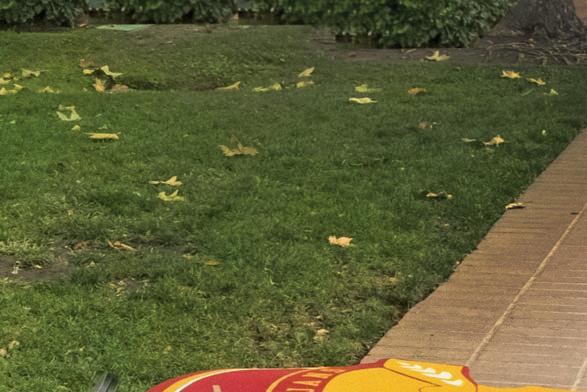
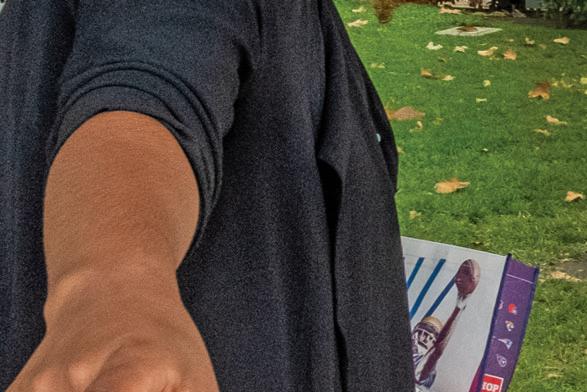
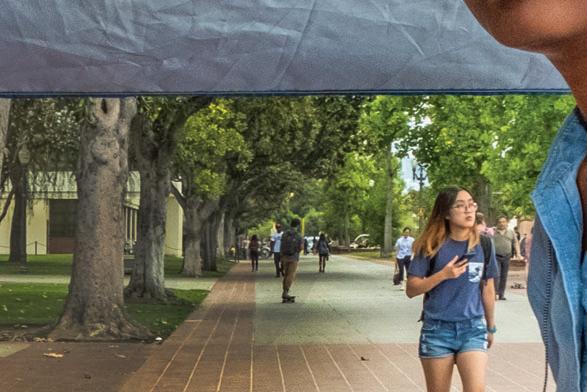

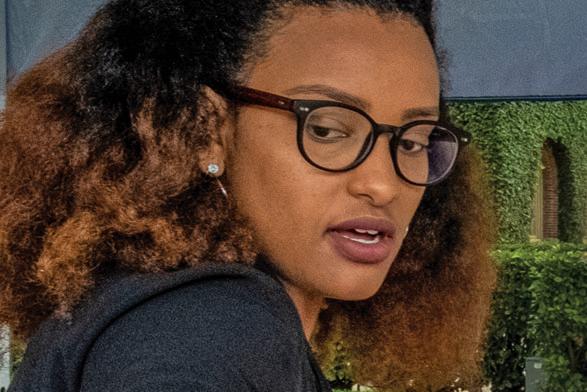
Changing the model from screening and referral to direct service delivery by staffing expansion: counseling services had previously focused on providing brief assessment with referral and crisis services to students. The brief assessment process followed best practices and a very structured process to identify students at risk of harm to self and other as well as students in crisis. While this screening process was robust, we recognize that this process left many students feeling not cared for in the way that we would want. The referral off-campus for longer-term care (that most students received) was very difficult for many students who needed to travel to distant locations and navigate the appointment process. Complicating this was the lack of appropriate options for mental health in our community that reflects the lack of access to mental health services across the nation. Through the addition of therapists during the 18-19 academic year, we will be able to provide initial care to almost all students presenting to counseling services a reduce the percentage of students referred to off-campus care.
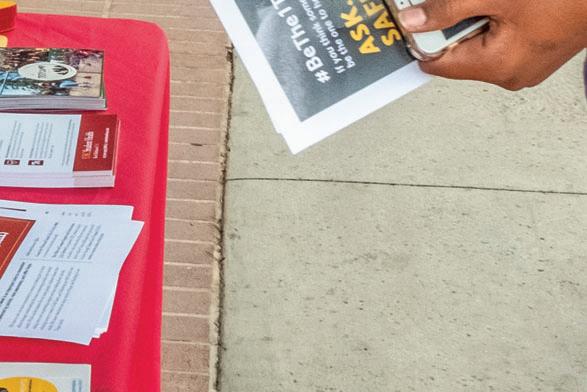



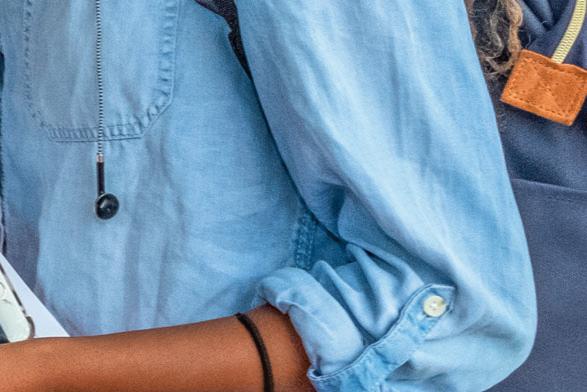
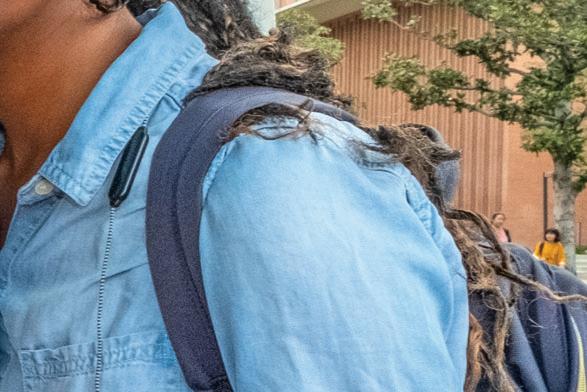
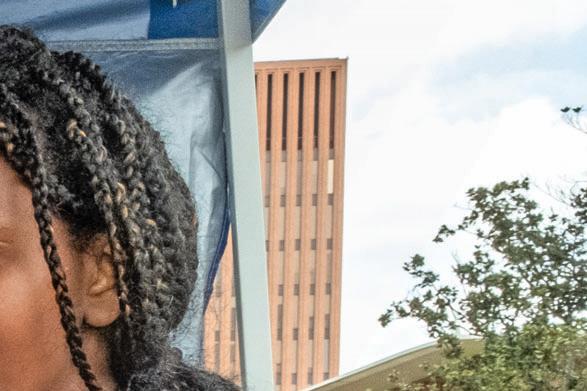
2019 update: The current ratio of professional clinicians to students has been increased to 1:1,000, which is the recommendation for a university counseling center at the student body size of USC. This is made possible by the addition of twelve full-time counselor positions to Counseling and Mental Health Services, an increase of 50% of staff size. Since the addition of staffing capacity, utilization has increased in tandem at nearly the same rate: appointments for counseling are up by 45% (in comparison to the same point in time from the previous year.) Students who would benefit from a longer-term counseling relationship will be able to access the new counseling practice— under the auspices of the Department of Psychiatry and Behavioral Sciences, Keck School of Medicine of USC, that is opening on the 5th floor of the Engemann building in November, 2019. (See next section.)
Additionally, Counseling and Mental Health have worked with the Student Health Insurance Program (Aetna) to create broader coverage of Tier 1 behavioral health partners.
EXPANSION/IMPROVEMENT OF SERVICES
During the 17-18 academic year, we removed the wait list for service in favor of providing appointments; provided intakes for all students presenting in crisis; shifted resources to ensure that initial consultations occurred within 72 hours; and that crisis treatment occurs immediately. USC Student Health is also working to develop additional resources within the department of psychiatry to provide care for students with long term mental health needs.
The Department of Psychiatry and Behavioral Sciences, Keck School of Medicine of USC: New Counseling Practice to open clinical practice
The Department of Psychiatry in the Keck School of Medicine is opening a new Keck Medicine clinical practice exclusively for USC students. The practice will be available to USC students (from both campuses) and accepts a variety of insurance products, including the Student Health Insurance Program (SHIP) that is provided through Aetna. The new practice is located conveniently on the 5th floor of the Engemann Student Health Center on the University Park Campus and can be accessed through a referral from Counseling and Mental Health Services. This practice opened for services in November, 2019.
ADDITION OF HIGH-IMPACT PROGRAMS
Through additional staffing, Counseling and Mental Health Services in FY18-19 was able to offer several well-researched high impact programs previously not provided. “Let’s Talk” is based on a national model in which counselors are available across campus in various locations to provide informal drop-in consultation and conversation. An integrated behavioral health program will place a counselor within the medical clinic for immediate consultation and intervention. Studies have shown that many students, including international students, students of color, and male students, are more likely to access mental health services when provided in a medical clinic.
2019 update: The “Let’s Talk” program was a well-received outreach program in the 2018-2019 year and is now offered three times a week on locations at UPC and HSC/Alhambra. Kelly Greco, licensed clinical psychologist and assistant director of outreach for Counseling and Mental Health Services, is spearheading an outreach effort with the academic schools and with student leadership on the University Park Campus, and is working with Summer Zapata, licensed clinical psychologist, who is expanding outreach to the health sciences campus community.
The behavioral health consultant position has successfully recruited—Jennifer Hsia, a licensed clinical psychologist, is now part of the team in the medical patient care centers (on floors 1 and 2 of Engemann Student Health Center), and is available to consult with medical providers when patients may benefit from assessment from a mental health clinician in approaching their complete health needs.
ENHANCING STUDENT SUPPORT NETWORK WITH PARENT/FAMILY EDUCATION
USC Student Health and campus partners in student well-being are developing “Thrive,” a parent guide to supporting their student’s development in the college years. The effort is to give practical advice for parents on how they can be active partners in a student’s health and well-being, and discussing key issues such alcohol and substance abuse, healthy sexual relationships, stress, resiliency, and adapting to college life.
2019 update: The “Thrive” Guide for parents has been created and promoted to parents of incoming USC students, made available at orientations, etc.
JED CAMPUS PROGRAM
USC Student Health, together with a broad coalition of campus partners, are leading the Jed Foundation recommended programs on campus. The Jed Foundation provides a framework for mental health, substance abuse, and suicide prevention efforts; USC Student Health is assessing outreach, prevention and treatment for strengths and areas for improvement. As part of Jed this spring, USC completed the Healthy Minds Survey to gain a deeper understanding of the needs of students and will begin implementing the Jed recommendations in fall of 2018.
2019 update: USC is now a Jed campus partner, and has recently signed on as an early adopter of an online mental health and well-being module, the Mental WellBeing for Students course, developed in partnership with the JED Foundation. The course is currently in testing and expected to be ready for campus use in spring 2020.
IMPROVING CRISIS RESPONSE
During the past semester, following the death of a student on campus, a multifaceted approach was taken including crisis and grief debriefing. Learning from this experience we hope to facilitate more strategic conversations about how to respond to campus tragedies, and more specifically student suicides, over the coming months. This includes chartering a campus crisis response team with USC Counseling and Mental Health Services leading the strategic plan. Senior leaders in USC Student Affairs and other key areas will lead the communication and implementation of the comprehensive strategy and plan and involve the entire university.
2019 update: Early in the academic year, USC Student Health responded to improving protocols for post-ventions on student death, crisis, and grief, in conjunction with Crisis Support and Intervention, to develop a crisis response plan that mitigates risk of additional student mental health incidents while supporting individuals experiencing grief in the context of the campus environment. A campus-wide campaign on suicide prevention was launched in conjunction with National Suicide Prevention Week on September 9, 2019.
2019 update: In listening to the feedback from students concerned about protecting vulnerable students who survive sexual assault, USC Student Health has initiated two programs to alleviate additional trauma: 1) a private rideshare account so that clinicians/staff in Relationship and Sexual Violence Prevention and Services can offer non-law enforcement transportation to a SART center for forensic examination and specialized counseling service; and 2) the development of an on-call Advocates program that is available 24/7 to assist survivors as they navigate to appropriate care and through offices that provide accommodations, support, and reporting options. USC Student Health is also planning on training one full-time nurse for qualification as a sexual assault response nurse to bring specialized expertise into the organization, when staffing is fully complete in clinical care.
Prevention, Outreach, and Public Health
USC Student Health has transitioned from an older health education model to a public health model, and has added staffing for specialized prevention education efforts.
2019 update: The existing outreach program has been enhanced by the addition of a full-time data research analyst and a full-time biostatistician to the Health Promotion Strategy group, further providing evidence-based research to support best practices and policy recommendations on key health-related campus issues including inclusivity and access to care across socioeconomic, gender-based, and cultural experiences; alcohol and other drugs; mental health and stress factors; sexual assault and sexual harassment.
2019 update: University partners training and discussion on trauma-informed care (Student Well-being Institute, June 2019, held in partnership with USC Student Affairs) that introduced key concepts and risk factors to campus partners, faculty, and student-facing staff.
2019 update: Bystander Training — A pilot program on bystander training for sexual assault prevention (“Trojans Act Now”) was initiated by the Relationship and Sexual Violence Prevention and Services group, with campus partner Undergraduate Student Government in February, 2019 — this has been expanded to promotion among other registered student organizations for the 2019-2020 academic year and is open to all USC students. These efforts are coordinated by a new staff position, a full-time violence prevention specialist.
2019 update: Consent Workshops (“Trojans Respect Consent”) for incoming first-year students. Starting this fall (2019), new USC undergraduate students are required to take a new, in-person workshop on affirmative consent. The program helps new students navigate their way to positive relationship encounters, and is facilitated by two new staff positions in violence prevention education. The goal of this program is to proactively initiate discussion and thought on consent and healthy relationships at the beginning of an undergraduate student’s journey through college life, and is expected to reach the roughly 4,000 incoming firsttime, first-year students within the first 8 weeks of the academic year, 2019-2020.
2019 update: Emergency Planning — USC Student Health is an active partner with emergency response units on campus in the public health education and coordination efforts around health-related matters, including management of infectious disease (measles) and natural disasters (earthquakes), especially as it pertains to the University Park Campus. USC Student Health medical teams will participate in drills and operate a medical command unit in the areas adjacent to the Engemann Student Health Center during the “Great Shakeout” on October 17, 2019.
2019 update: Immunization of New International Students — With a newly expanded effort to fully utilize health information technology systems, promote immunization requirements, and provide extensive patient education materials in Chinese translation, the fall immunization fair for international students (“Immuchella”) drew 2,941 students to the Engemann Student Health Center over a two-week period, representing 67% of all USC international students within that time period. Flu immunizations also reached a record 77% of all students this season, through targeted expansion of community outreach on campus.


